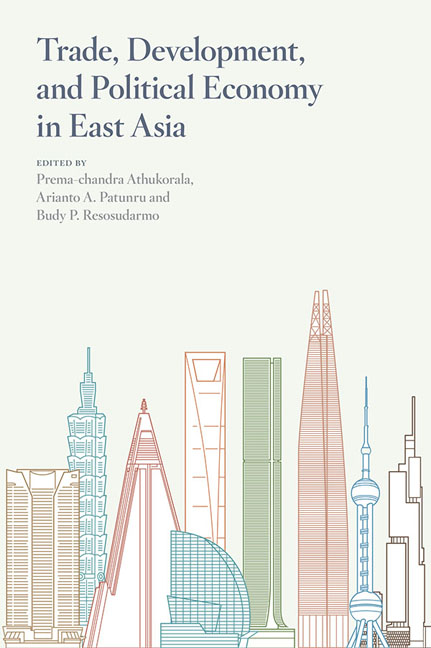Book contents
- Frontmatter
- Contents
- Tables
- Figures
- Contributors
- Foreword
- Acknowledgments
- Glossary
- 1 Introduction
- PART 1 TRADE
- PART 2 DEVELOPMENT
- PART 3 POLITICAL ECONOMY
- 11 Rethinking the role of the state in ASEAN
- 12 The ill-fated currency board proposal for Indonesia
- 13 What are grain reserves worth? A generalised political economy framework
- References
- Index
13 - What are grain reserves worth? A generalised political economy framework
from PART 3 - POLITICAL ECONOMY
Published online by Cambridge University Press: 19 May 2017
- Frontmatter
- Contents
- Tables
- Figures
- Contributors
- Foreword
- Acknowledgments
- Glossary
- 1 Introduction
- PART 1 TRADE
- PART 2 DEVELOPMENT
- PART 3 POLITICAL ECONOMY
- 11 Rethinking the role of the state in ASEAN
- 12 The ill-fated currency board proposal for Indonesia
- 13 What are grain reserves worth? A generalised political economy framework
- References
- Index
Summary
What explains volatility in world food prices? Are the ‘fundamentals’ of supply and demand the basic factors? Can national or international policies towards food grain reserves help to stabilise food prices? What are food stocks ‘worth’ if the levels of grain reserves, especially in large countries, affect food trade policies in these countries? This effect would be the reverse of the usual causation where policies can directly affect the levels of both public and private stocks.
There are four basic ways the economics profession thinks about these questions.
The first is second nature to economists, who use basic supply and demand models as the fundamental explanation of price formation. The ‘fundamentals’ approach uses these models to generate an equilibrium price, where the global level of stocks is an exogenous factor that influences the probability of a price spike when there are shocks to supply or demand. A number of well-calibrated models using this structure are used routinely, especially by international research centres such as the Food and Agriculture Organization (FAO), the Food and Agricultural Policy Research Institute (FAPRI), and the International Food Policy Research Institute (IFPRI) to understand the impact of changing trends in supply and demand, and shocks, to food prices.
The second approach explicitly introduces the storability of the commodity into price formation. The supply of the storage model brings in expectations and makes stock levels endogenous with price formation. To be empirically useful, however, reasonably accurate and timely data on levels of stocks held by commercial trade are critical. These models have a long history, but the standard reference remains Williams and Wright (1991). A modern application with important implications for the role of biofuels in food price formation is Roberts and Schlenker (2013).
The third approach recognises that such stock data are often not available for commodities where individuals and small firms hold a major share of stocks between harvest and consumption, a factor that is especially important for the world rice market (Timmer 2009b). To cope with this reality of the industrial organisation of some commodity markets, a behavioural model adds hoarding by individuals, with levels of stocks in the hands of these agents largely unobserved but important for short-run price formation. In this approach, ‘non-traditional speculation’ in financial and commodities markets can also impact price formation without having a visible impact on measured stock levels (Timmer 2012).
- Type
- Chapter
- Information
- Trade, Development, and Political Economy in East AsiaEssays in Honour of Hal Hill, pp. 235 - 248Publisher: ISEAS–Yusof Ishak InstitutePrint publication year: 2014

